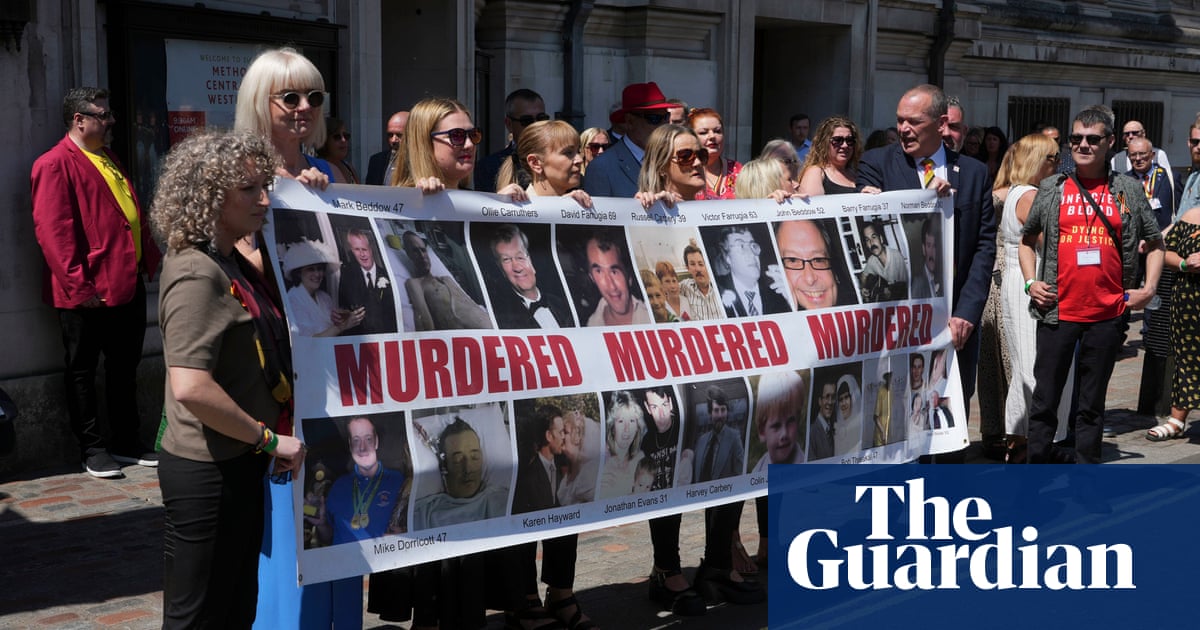
Thousands of victims of the infected blood scandal and their families are to learn how ministers plan to compensate them for their suffering and loss of earnings after Rishi Sunak pledged to pay “whatever it costs”.
The details of the long-delayed scheme, which is expected to cost more than £10bn, will be set out by the Cabinet Office minister John Glen on Tuesday.
The scale of the scandal, in which 3,000 people died after 30,000 were given contaminated blood products or transfusions from the 1970s to the early 1990s, was laid bare in a 2,527-page report by Sir Brian Langstaff on Monday. He criticised the government for “working at sluggish pace” over compensation. The government failed to set up a compensation scheme in time for the completion of Langstaff’s final report, as he had recommended last year.
“It may be late, but it is not too late: now is the time, finally, for national recognition of this disaster, for proper compensation and for vindication for all those who have been so terribly wronged,” Langstaff said.
On Tuesday, the work and pensions secretary, Mel Stride, said the nation was “shaken to its core by what has happened” and told LBC that he was “absolutely confident that we will be doing the right thing when it comes to compensation here, and it’s absolutely essential that we do.”
Stride said questions of criminality were a matter for the police but told BBC Radio 4 Today that any appropriate action should be taken “without delay”. He added: “I am very confident that every single element will be appropriately examined and ultimately appropriately addressed.”
He told Sky News: “I’ve no doubt the police and others will be looking very carefully at this and as to whether there are … for example suspected corporate manslaughter charges that need to be brought. I’ve no doubt the authorities will be looking at those very carefully … it will now be pored over very carefully by many different parties.”
Victims of the scandal have called for the withdrawal of the knighthood of Lord Ken Clarke, who was criticised by the report as having given “false assurances” over the issue to the inquiry.
Stride said that due process would have to be followed. “Clearly there are questions that I’ve no doubt Ken will be addressing in time, and others will have a view on, [but] his knighthood… is a matter for the Forfeiture Committee and others, not for government to take action in that particular respect,” Stride said.
A separate report on compensation, published in 2022 by Sir Robert Francis, suggested thousands of people should receive minimum payments of £100,000 each. Francis recommended a tariff scheme to allocate varying levels of compensation based on the severity of illnesses, with victims providing medical evidence to support their claims.
Des Collins, a solicitor who represents more than 1,500 victims, said the scheme would probably follow the recommendations contained in Francis’s report.
Sunak promised to implement the scheme in full. Speaking in the Commons on Monday, he said: “We will pay comprehensive compensation to those infected and those affected by scandal, accepting the principles recommended by the inquiry which builds on the work of Sir Robert Francis.
“Whatever it costs to deliver this scheme, we will pay it.”
after newsletter promotion
Collins said: “Everyone is insistent this should not be a long, drawn-out process. It has to be done as quickly as reasonably possible.”
He urged the government to avoid compounding delays with the kind of payment problems that have beset victims of the Windrush scandal. He said: “One reason why Windrush has been such a disaster is because they tried to do it on the cheap.”
Collins called on the government to offer free legal assistance to claimants. “At this moment in time there’s no commitment by the government to provide any form of legal support to victims putting these claims in to whichever body comes into existence, which makes it virtually impossible to succeed unless they are very lucky and happen to fill in the form properly.”
Richard Warwick, 58, was infected with HIV and hepatitis C during experimental trials when he was a pupil at Treloar’s, a specialist school in Hampshire for haemophiliacs. He said: “Compensation won’t bring back anyone’s health and it won’t bring back children that were lost. But the government has to financially address this and recognise the years and years of salaries, pensions, mortgages that were lost.
“There was so much we missed out on while the government dragged its feet.”
Source: theguardian.com


















